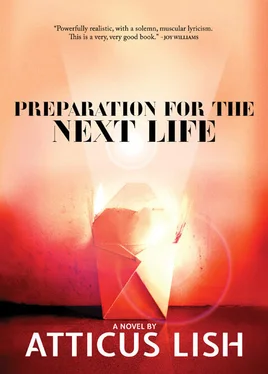The officer would say, That could very possibly be true, but the situation he was dealing with now was that she was somebody without ID, and until we can make sure you are who you say you are, we’re gonna hold onto you.
And then he would handcuff her and put her in the van. Whaddya think? his partner would ask, opening the log book. They’d book her for prostitution, because this was a known track, and put her in the pen in East New York.
This near encounter switched her hunger off and energized her out of fear, and she walked several more miles through the middle of the night before she again remembered that she was tired.
The police van’s white, red, and orange flashers disappeared behind her as the road bent and she passed silos for sand and gravel, a diagonal conveyor belt against the sky, cement trucks nose to tail like elephants behind a fence. An alley full of smashed-up cars and glass. East Coast Auto Salvage. There was a black field with powerful lights behind it, blinding if you stared at them even from a half-mile away. A compressor was running. Every now and then a car full of young men coming from Long Island came by, not gangbanging, just poor. Women drove by alone, texting, headed to a party. Cars came by, just-sold, with white writing still on the windows, saying 4/S, how many miles. High weeds were growing from the median. The houses looked like country shacks. She saw ferns. It looked like where you would park a truck off the highway going south. The trees in the lots were wild.
She passed a burned-out laundromat, the Deeper Life Bible Church, and saw a single tall black woman with a kind of physical correctness, careful posture, in slacks, turning down a side street, headed in the direction of thudding music, appearing dignified and fatalistic.
The burned-out buildings came more frequently, until everything had a dead deserted feeling. A mural had been painted on a roll-down gate, showing the pyramids and pharaohs of Egypt looming like mountainous thunderclouds above the New York skyline, in which the Towers were still standing. It said Civilization Began In Africa. Step In At Your Own Risk. But the store it was for was ripped-out and ransacked from within. You could see through the holes in the bricks. Further on, the sounds of deep music came from behind the houses, from what sounded like a well hidden behind abandoned and burned-out squats, mattresses and sofas in piles of trash next to dark porches you were afraid to look upon. There were no more city blocks, it just went on and on. As she cleared the corners of buildings, she saw scenes in the trees behind them, distant silent figures in white shirts milling around a car with all the doors open. Everyone wore an article of red, whether it was their shorts or hat. There was the sense of strangers who lived among each other, robbing each other, predicting who would be robbed next. The road ran by a park area that was dead gray in the dull light, and the houses behind it were utterly silent. She heard a string of pistol reports. A bearded man ambling in the street lifting his shirt and touching his flat belly noticed her the way you notice money lying on the sidewalk. He looked around, as if to see if anyone had claimed her. The Freeport bus flew by her and she would have tried to board it, but it didn’t stop.
Fearing to go on, she turned north, and the road took her past trellises and crickets and white iron fences, like something from a bayou. It was still a ghetto. She passed one-story bars with blue lights and a tall Jamaican guarding the door in a pastel jacket and gator shoes. She crossed Mexico Street and Murdoch Avenue. Cars tricked out for Saturday night with unusual light configurations, double headlights, went zipping by, pulled sudden turns, still hunting that party, gunning into the back streets. One gave a sudden blatting roar, dodged around a jeep, and drag-raced away, sounding like a motorcycle droning off into the distance. She passed posters outside churches waging spiritual warfare. People came out of clubs dressed like sweet sixteens. The night had turned from hot to temperate. There were mosquitoes. Things started getting quiet. There were long spaces between the cars. She saw a house with the porch door open and the TV so big it seemed to invite her inside, but no one was visible. She heard an air conditioner running. Crossing under the train tracks, she heard crickets in the brush. On the other side, a billboard in the weeds showed women in strapless dresses toasting her with vodka, eyes shut, laughing.
In someone’s yard, a clutter of handmade signs on boards and bedsheets caught her eye: Don’t Smoke Anything. Drinking = Damage, Disease, Devil. The same letter D was used as the beginning for all the words. Smoking = Sin, Suffer, Satan. People Going Places Ride When They Wear Adidas. A Texas State flag hung on the porch. It said Ministry on the roof.
The sight of it all distracted her. She stepped into the street without looking, and a car sped out of nowhere and almost hit her. When she went back to pick her shoe up, the streetlights started reeling and she had to catch her balance. Fatigue had made her dizzy drunk. She felt strange, but the feeling went away when she was moving. She went back to walking and she was all right. But she could not think. The moon looked like a streetlight, and she had trouble remembering that it was in the sky instead of down here with her.
She walked north on Woodhill through spider webs and hearing crickets. The silent dark houses and power lines. Thunder from a jet in the sky. The largest tree she had yet seen was looming up above her. The leaves rustled, a sound of onset, of something coming to boil and seething. Then a bus — a new, clean air-conditioned hydrogen bus — lit like an airport shuttle — zipped by and blocked out the leafy rustling with the smooth firm sound of its engine.
Then she crossed an avenue without street signs, revelers pulling u-turns. The Cambria Heights Academy. Again, the distant gunshots.
Down a dark street, she saw one light: a dull blue interior through an open window and, in its isolation, it looked like somewhere a crime would take place. Someone said hi from a car. A mailbox said Khan. South Asian flags had been stuck in the ground like quills.
She made it to Hillside Avenue and beheld an apartment building with a headband of blue neon wrapped around it. A homeless man, bearded like a prophet in surgical gloves, came along pulling a shopping cart and picked a plastic bottle out of the gutter. She passed brick apartment buildings, two-tone walls. A cool breeze blew. The avenue went for miles in both directions. She was depressed with hunger and seeing spots. She continued east. An ambulance or cop car drove toward her and passed in silence, no sirens, just lights flickering and flashing like burning sparklers.
She thought, All I have to do is stay awake until morning and then somewhere I can eat something. Then she remembered she didn’t have any money.
A car pulled up at the light with the stereo bumping and she ignored whatever the young men in ball caps yelled at her.
She passed a brick building housing an Islamic community center in salmon-colored brick. The avenue widened, smoothed, acquired a median ahead. A bus went by and it was orange and had an N for Nassau instead of a Q for Queens. She passed a big bright gas station covered in flags as if still celebrating a grand opening. The roof was lower than the gas stations in the desert in the west, where the Chinese build them so high they look like they are spiders on telescoping legs. Over the top of this one she saw big trees.
Now Zou Lei was in a gas station looking at all the cookies and milk and potato chips in a trance, having lost track of how she had gotten here. Droop-lipped men in dress shirts and slacks were coming in and out, paying for coffee and the Punjabi Times and going back out to their taxis. The wall clock said three a.m. She felt as if time had jumped ahead.
Читать дальше












